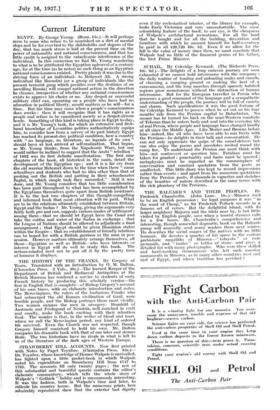Current Literature
EGYPT. By George Young. (Bonn, 15s.)—It will perhaps seem to some who refuse to be nourished on a diet of mental slops and be for ever tied to the shibboleths and slogans of the day, that too much stress is laid at the present time on .the power of nationality and national consciousness, and that too little credit is assigned to the cataclysmic interference of the individual. In this connexion we find Mr. Young wondering to what is to be attributed the Egyptian upheaval of a century ago, for at the time (as he notes) no such thing as an Egyptian national consciousness existed. Pretty plainly it was due to the driving force of an individual—to Mehemet Ali. A strong individual like Mussolini (or a group of individuals like the present terrorist gang which presides over the destinies of an unwilling Russia) will compel national action in the direction he chooses, irrespective of whether any national consciousness exists to approve his choice or no. Any despot or successful military chief can, operating on a people who have had no education in political liberty, mould matters as he will—for a time. But the time may come when a people's consciousness does awake : then it will recognize that it has rights as a people and refuse to be considered merely as a despot-driven horde. Something of this kind is taking place in Egypt to-day, and it is Mr. Young's task, for which an extensive and first- hand knowledge of Levantine polities authoritatively equips him, to consider how from a survey of its past history Egypt has reached its present-day political condition, how a country with " no language, no literature, no legends of its own should have at last arrived at self-realization. That began, so Mr. Young thinks, from the Napoleonic Wars, but one would rather be inclined to suggest that the Arabi " rebellion " of 1882 was its first definite manifestation. The first nine chapters of the book, all historical in the main, detail the development of the Egyptian ego ; and it is a far cry from the old warrior Mehemet down to the time when there came schoolboys and students who had no idea other than that of pushing out the British and putting in their schoolmaster Zagiul, in which simple task they succeeded." Still it was done, and Mr. Young considers that too little consideration has been paid throughout to what has been accomplished by the Egyptians themselves quite apart from British assistance. It is to the last two chapters of this thought-compelling and informed book that most attention will be paid. What are to be the relations ultimately established between Britain, Egypt and the Sudan ? Mr. Young, giving the arguments very fairly both pro and con, suggests various modes of settlement : among them—that we should let Egypt have the Canal and take the cotton and water of the Sudan in exchange ; that the League of Nations should be allowed to adjudicate a final arrangement ; that Egypt should be given Dominion status within the Empire ; that no establishment of friendly relations can be hoped for with a British garrison as the man in pos- session. However matters ultimately arrange themselves, all those—Egyptian as well as British—who have interests or interest in Egypt will do well to study this book. The serious-minded need not be put off it by the pretty turn of humour it displays.










































 Previous page
Previous page